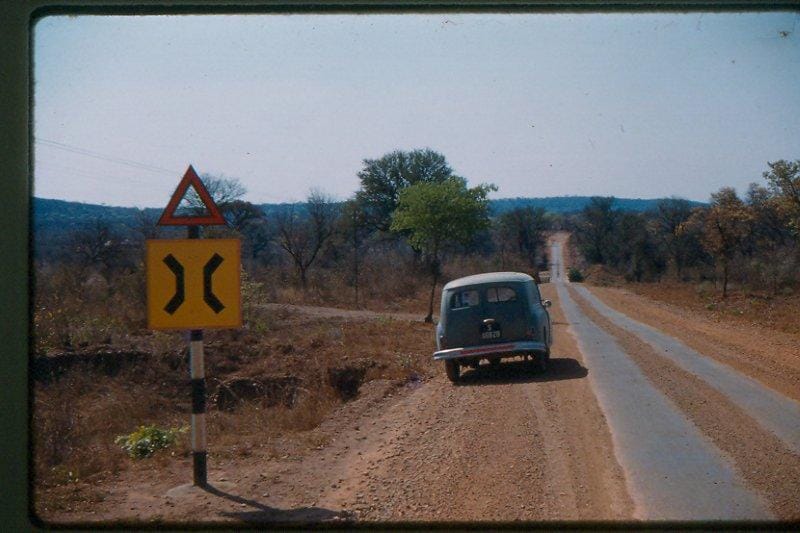Rhodesian Hospitality

The Que Que River strip road, near Greenham Farm, one of Rhodesia’s many lonely roads, even in the 1960’s.
Rhodesian Hospitality
No one ever came to visit Greenham Farm. One day, in town, Joan said straight out, “ Why haven’t you been out to the farm to see me all the time I have been there on my own with no car?”
The dear lady looked her up and down and said spitefully, “Why should I —living in sin with your brother-in-law as you are!” She walked off, head in the air.
Joan laughed. Nothing could be further from the minds of either of them. Gervas was seldom home and so tired when he was. Then they were usually at loggerheads over something.
Rhodesian Hospitality
At last he returned, to say a friend on another farm had invited her and the children to stay for a few days. It would be a lovely change. She packed excitedly.
After a long hot drive, he stopped at a side track and said, “the house is up the road. I must be getting on—I’m late.”
Carrying the case, with a child holding each hand, they set off along a winding track, thick with dust, for about two miles.
They arrived at an unattractive little house with no garden in the middle of the bush. She knocked at the door. A woman came out.
“What do you want?” she asked.
Joan smiled sweetly and said, “I believe you kindly invited us to stay for a few days. It really is so kind of you.”
She looked at them in horror and burst out “That bloody hubby of mine. He is always doing crazy things like that. I haven’t got three beds and I knew nothing about it. You can’t stay.”
The children burst into tears. Joan said quietly, “I’m afraid we’ll have to. Their father is on the Green’s farm that he’s running, what with the war still on, and we have no transport.”
“Oh, alright, but we’re going to Bulawayo, tomorrow, so you’ll have to do for yourselves.”
The servants were hostile and furious when the husband and wife departed the next day and they stayed on.
She shared a bed with Tim. Angela had a narrow stretcher. They survived for a day or two. Then Tim became desperately ill suddenly, the way young children sometimes do. His temperature soared. She put him in a cold bath, with only Disprin for treatment. He became delirious.
She was scared. She wrote to his father, gave a reluctant servant some money and told him to ride his bicycle as fast as he could to find the boss on the Green’s farm. He was so reluctant that she told him she was a witch and if the little boy died she would put the most awful spell on him!
He took off peddling at top speed, looking wildly over his shoulder until she was out of sight.
At that very moment Tim’s temperature began to drop and he at last slept.
When Gervas arrived, he was not amused.
“What a fuss. The child is perfectly alright. I just had to leave everything. You certainly put the fear of the devil into that boy who brought your note!”
She explained they had been abandoned and she had panicked.
Grumbling, he drove them home.
It was their only excursion.
Excerpt taken also from Rain on the Roof, by Joan (nee Millard) Freyburg (1999) ISBN 0 646 38477 5 with family permission. Tim Hughes has electronic copies of this wonderful book that may be available on request via the comments section of this blog.
